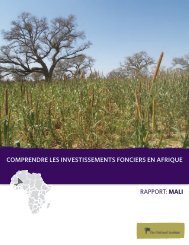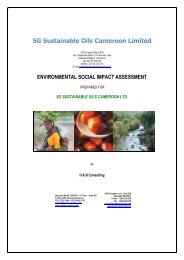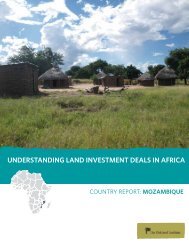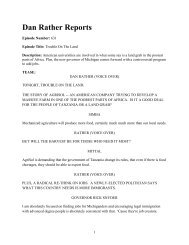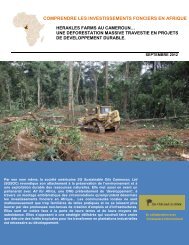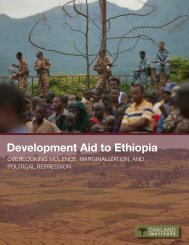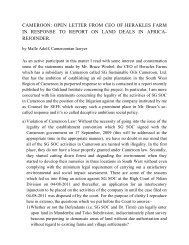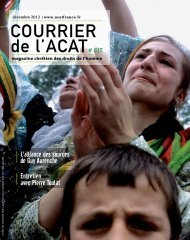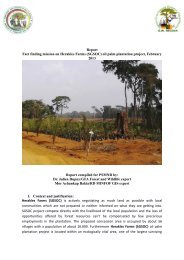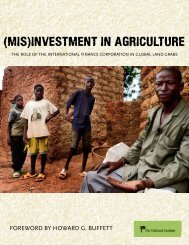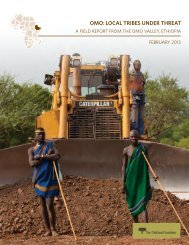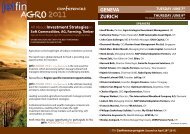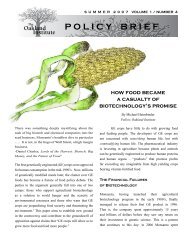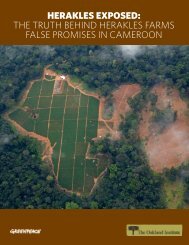understanding land investment deals in africa - Oakland Institute
understanding land investment deals in africa - Oakland Institute
understanding land investment deals in africa - Oakland Institute
- No tags were found...
Create successful ePaper yourself
Turn your PDF publications into a flip-book with our unique Google optimized e-Paper software.
of <strong>land</strong> for nom<strong>in</strong>al lease payments that do not take<strong>in</strong>to account the loss <strong>in</strong> <strong>land</strong>-based livelihoods for hostpopulations. Companies’ social obligations also tendto be vague and not formalized, lead<strong>in</strong>g to long delaysor nonperformance <strong>in</strong> the delivery of social benefitssuch as education, health services or road build<strong>in</strong>g and<strong>in</strong>frastructure.Despite the massive <strong>land</strong> areas implicated by manyof these <strong><strong>in</strong>vestment</strong>s, there rema<strong>in</strong>s relatively littleevidence of <strong><strong>in</strong>vestment</strong> activity on the ground. This islargely due to the political uncerta<strong>in</strong>ty of the currenttransitional context. Investors moved <strong>in</strong> quickly tosecure their leases, but held off <strong>in</strong>vest<strong>in</strong>g money <strong>in</strong>todevelop<strong>in</strong>g the property until they could see howevents would unfold <strong>in</strong> the country. The lack of visible<strong><strong>in</strong>vestment</strong> activity allowed a backlog of <strong><strong>in</strong>vestment</strong>sto accrue without anyone appreciat<strong>in</strong>g the true scale ofthe transfers. Private <strong>in</strong>vestors were able to secure largeareas of <strong>land</strong> without any significant push back fromcivil society, s<strong>in</strong>ce <strong>in</strong> many cases, the communitiesliv<strong>in</strong>g on the <strong>land</strong> were not even aware of the leases.The true test for companies comes when they go to theground to beg<strong>in</strong> construction. The importance of <strong>land</strong>basedlivelihoods and the heavily militarized natureof South Sudanese society make for a combustiblemix. There is a long history of social opposition tocontroversial development projects <strong>in</strong> the country, and<strong>in</strong> many respects, the government’s approach to largescale<strong>land</strong> <strong><strong>in</strong>vestment</strong>s shows that it has not learnedfrom the mistakes of the past. If companies deny localpopulations access to <strong>land</strong> and natural resourcesthat are <strong>in</strong>dispensible to local livelihoods, they riskcontribut<strong>in</strong>g to <strong>in</strong>creased social unrest and conflict.While the role of an unbridled private sector <strong>in</strong>promot<strong>in</strong>g conflict is relatively well established, what isless apparent, and perhaps somewhat counter<strong>in</strong>tuitive,is the way <strong>in</strong> which <strong>in</strong>security can actually serve toencourage certa<strong>in</strong> types of <strong><strong>in</strong>vestment</strong>. Legacies ofconflict have left a South Sudanese state that is weak andunable to effectively extend its control <strong>in</strong>to rural areas.The underdeveloped regulatory framework providesa fertile ground for “high risk, high return” <strong>in</strong>vestors,who are able to exploit the lack of clear <strong>land</strong> acquisitionprocedures and the jurisdictional gray areas betweenthe levels of government to negotiate favorable <strong>deals</strong>with government officials and community elites. Theabsence of a proper regulatory framework also meansthat <strong>in</strong>vestors are able to secure leases without hav<strong>in</strong>gto demonstrate that they have the necessary capitalwith which to develop their property.Despite the lack of a regulatory framework, <strong>in</strong>ternationalf<strong>in</strong>ancial <strong>in</strong>stitutions (IFIs) and donor countriesare promot<strong>in</strong>g large-scale <strong>in</strong>dustrial agriculture asa shortcut to rapid development <strong>in</strong> South Sudan.In do<strong>in</strong>g so, they <strong>in</strong>advertently compromise locallivelihoods. The government is grant<strong>in</strong>g foreign<strong>in</strong>vestors an assortment of privileges, many of whichare not available to domestic enterprises, such as taxholidays, reduced limits on capital repatriation, andstreaml<strong>in</strong>ed procedures of <strong>land</strong> acquisition. Amidstthese efficiency-driven development models, theimpacts on the human rights and dignity of millions ofthe rural poor are often overlooked or ignored.This report is divided <strong>in</strong>to five sections. The firstsection provides an overview of the political, social andeconomic context. It tells the story of South Sudan’sroad to <strong>in</strong>dependence and exam<strong>in</strong>es issues underly<strong>in</strong>gfood security and <strong>land</strong> availability <strong>in</strong> the country. Thesecond section explores the legal framework <strong>in</strong> SouthSudan, <strong>in</strong>clud<strong>in</strong>g several key legislative reforms thatthe government of South Sudan enacted <strong>in</strong> 2009.The third section discusses the <strong>in</strong>stitutions <strong>in</strong>volvedwith <strong>land</strong> <strong><strong>in</strong>vestment</strong>s <strong>in</strong> South Sudan, exam<strong>in</strong><strong>in</strong>ghow various actors view the role of the private sector<strong>in</strong> the country’s post-conflict recovery efforts. Thefourth section provides detailed analysis of four casestudies of <strong>land</strong> <strong><strong>in</strong>vestment</strong>s <strong>in</strong> South Sudan, <strong>in</strong>clud<strong>in</strong>g<strong><strong>in</strong>vestment</strong>s <strong>in</strong> agriculture, agrofuels, forestry, carboncredits, and ecotourism. The f<strong>in</strong>al section concludeswith a summary of the ma<strong>in</strong> po<strong>in</strong>ts and a series ofrecommendations for the government.The Oak<strong>land</strong> <strong>Institute</strong> <strong>understand<strong>in</strong>g</strong> <strong>land</strong> <strong><strong>in</strong>vestment</strong> <strong>deals</strong> <strong>in</strong> <strong>africa</strong>: south sudan | 6



